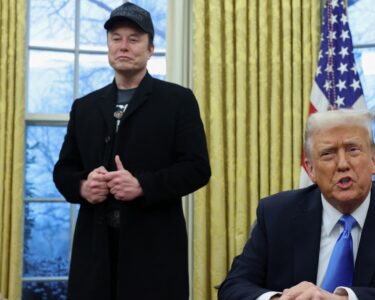China’s economy will be forced to recalibrate because of a “fractured” global order, and the new drivers of growth will “disappoint” global markets, according to David Roche, president of Independent Strategy.
At its National People’s Congress on Sunday, the Chinese government announced a target of “around 5%” growth in gross domestic product in 2023 — the country’s lowest for more than three decades and below the 5.5% expected by economists. The administration also proposed a modest increase in fiscal support to the economy, expanding the budget deficit target from 2.8% in 2022 to 3% for this year.
President Xi Jinping and other officials took aim at the West for constraining China’s growth prospects, as relations between Beijing and Washington continue to deteriorate. New Chinese Foreign Minister Qin Gang said Sino-U.S. relations had left a “rational path” and warned of conflict, if the U.S. doesn’t “hit the brake.”
Veteran investment strategist Roche told CNBC’s “Squawk Box Europe” on Tuesday that “things have changed” permanently with regards to China’s role in the global economy, as Beijing will be forced to look inward to achieve its growth ambitions.
“China now knows that if it’s going to achieve its growth, it has to achieve it domestically, which means reform which is not yet undertaken, and it means getting the consumer to spend pots of excess savings, which it is very hesitant to do,” he said.
Roche also noted that the “hegemony of the U.S. is now fractured” in the global economic order, with Russia and China detaching from Western democracies. He highlighted that a third fragment has formed in the “big south,” including countries like Brazil and India, which he signaled are not overtly siding with authoritarian powers such as Russia, but are also prioritizing their own interests and resisting Western pressure to sever economic or military ties.
In a research note last week, Moody’s said that the external environment will remain challenging for China, as the U.S. and other high-income countries reposition their technology investment and trade policies in light of growing geopolitical and security considerations.
Roche said Beijing is well aware that the U.S. will look to curtail its global influence by growing the “technology gap,” which he expects to widen from five to 10 years at present to around 20 years. To do so, he anticipates Washington could use its might to monopolize trade with countries innovating in areas of technology that are capable of serving both missiles and cellphones — such as the semiconductor industry in the Netherlands.
“Additional measures by Western countries to restrict investment flows to China, block access to technology, restrict market access for China’s firms, and promote diversification policies, could continue to weigh on foreign investors’ risk perception regarding doing business in China,” Moody’s said in last week’s note. “These measures also have the potential to weaken China’s economic outlook.”
Mining stocks reacted with trepidation on Monday to the Chinese Communist Party’s cautious growth outlook, given the importance of Chinese operations in the sector. Roche argued that “what will disappoint in China is the way that growth is achieved,” as infrastructure using Australian or U.S. mineral imports will no longer be able to power the economy out of crises.
“I think the way that China has to go now is to mobilize its own masses to spend their money, trust the government, and not accumulate excess savings, so it will all happen in travel and in shops and in restaurants, and much less in the heavy duty stuff, which we all want to see as the motor of the world economy, because it is the motor of the Chinese economy,” he said. “I think that model is dead as a duck.”
While Beijing’s ambitious growth project has seemingly taken a backseat for now, leaders at the NPC focused heavily on national security and on the domestic political centralization of power.
The government expects the defense budget to grow by 7.2% in 2023, up from 7.1% in 2022, but strategists at BCA Research suggested in a note Tuesday that the official figure is often an underestimation.
“The Communist Party is also continuing the process of subordinating state institutions to its will, which reduces the autonomy of technocrats and civil service in favor of political leadership,” the Canadian investment research firm said.
“These actions will reduce the already limited degree of checks and balances that existed between the party and the state, while signaling to the outside world that China continues to pursue centralization and national security over de-centralization and global economic integration.”
Negative reactions and further investment restrictions are therefore likely, at least from the U.S., BCA Research strategists concluded.





